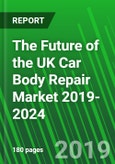Quality Repair Capacity Critical for Motor Insurers as Repair Costs Rise by a Third
The Future of the UK Car Body Repair Market 2019-2024, fully updates the in-depth coverage of the structure, volume and dynamics of the car body repair market in the UK. It analyses demand - and supply-side data from 2007 to date and forecasts future trends to 2023. Detailed analysis and commentary is provided.
Users of this latest biennial bodyshop report series, first launched in 1993 will benefit from the authors' uniquely long experience of how market trends have evolved in the sector, and where they're pointing now.
This brand new edition runs to 180 pages with 89 tables and charts, and includes:
- Market value and volume trends
- Numbers of independent and franchised bodyshop outlets, trends in bodyshop numbers
- Analysis of 10.1 million estimates for cars ultimately repaired to investigate repairs by vehicle make
- A market forecast to 2023 taking account of industry trends over the last decade and the macroeconomic conditions following the 2008/2009 recession
This report will be essential reading for vehicle manufacturers, insurers, investors, advisers, operators, suppliers and others who need to understand the risks and opportunities facing each of the key protagonists in a punishingly competitive market.
- Time saving: All the information you need in one place
- Crucial data: Input for your business planning
- Strategic: Market forecasts running forward to 2023
- Reliable: Based on primary research
- Detailed: 180 pages and 89 data tables and colour charts
- Great value: No comparable report is available at a comparable price.
Table of Contents
Executive Summary
A comprehensive report on the UK Car Body Repair Market, warns that a continued decline in repair capacity will lead to increased repair costs over the next five years.
The number of UK accident repair centres (car bodyshops) has fallen by 20% over the last decade from 3,950 in 2008 to 3,162 in 2018, and the author predicts a further decline over the next five years.
A shortage in repair capacity, combined with a 33.5% overall increase for insurance-related repair costs over the past five years, presents a significant risk for motor insurers profits in the years ahead.
With the number of bodyshops continuing to decline, it appears imperative that insurance companies and claims solutions providers adopt a strategy to truly work with their supply chain to secure repair capacity over the forthcoming years. It’s inevitable that repair costs will continue to rise but we believe that insurers need to act responsibly and focus their attention more on securing quality repair capacity for the safe repair of a vehicle and to provide the customer service aspects of a motor claim.
The author predicts that insurance-related repair costs will increase by a further 14% of the next five years. "We’ve taken a somewhat conservative view," says Bull. "Given the above-inflation increase that has taken effect over the past five-years, we believe that 14% is a conservative uplift that may well be exceeded. However, such above-inflationary repair cost pressures cannot continue at current rates, despite parts pricing and paint price increases, as accident damaged cars may become subject to becoming economic write-offs if the repair cost becomes too great."
The cost of parts alone on insurance-related repairs has risen by 40% in the past five year period, which presents a concern for motor insurers. New technologies in vehicle design, including Advanced Driver-Assistance Systems (ADAS), have had a bearing on driving up repair costs. A vehicle’s integral adaptive features, such as automate lighting, adaptive cruise control, lane departure warning systems, automatic lane centering, and so on, require technical repairs to be completed by highly competent staff and to be calibrated following an accident. This also presents bodyshops with a challenge due to a skills shortage, which only adds pressure onto labour costs.
This is why it’s critical for insurers to work with their body repair partners as it’s in everybody’s interest for bodyshops to attract and retain high calibre staff, ensuring that an insurer’s customer gets a safe repair.
Companies Mentioned
- 3M
- Admiral
- Ageas
- Alfa Romeo
- Allianz
- Audi
- Audatex UK/Solera
- Aviva
- Axa
- Axalta
- BASF
- Bodyshop Management Solutions
- BMW
- CAPS Consortium
- Chrysler
- Citroen
- Covea
- Cromax
- DS
- Dacia
- Daewoo/Chevrolet
- Daihatsu
- Direct Line Group
- Enterprise Rent a Car
- Esure
- Fiat
- Ford
- Glasurit
- Hastings
- Honda
- Hyundai
- Infiniti
- Innovation Group
- Jaguar
- Kia
- LV=
- Landrover
- Lexus
- Markerstudy
- Max Mayer
- Mazda
- Mercedes-Benz
- Mini
- Mitsubishi
- Morelli Group
- Nexa
- NFU
- Nissan
- PPG
- Peugeot
- Porsche
- R-M
- Renault
- Rover
- RSA
- Saab
- Seat
- Sherwin Williams
- Skoda
- Smart
- Spies Hecker
- Subaru
- Suzuki
- Thatcham
- The Innovation Group
- Toyota
- Vauxhall
- Volkswagen
- Volvo
- Zurich








